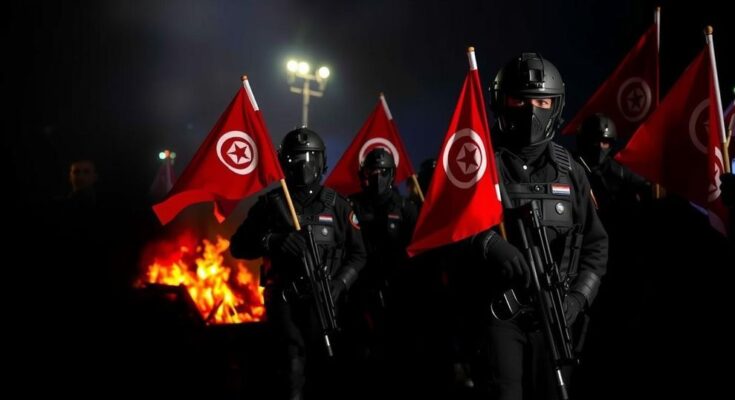Following the October 6, 2024 presidential elections in Tunisia, there has been a marked increase in the arrests and harassment of activists and journalists. Authorities are repressing dissent by targeting prominent figures involved in advocating for democracy and human rights. This environment of intimidation poses serious risks to civil society, highlighting the urgent need for protective measures for free expression and assembly.
In Tunisia, recent events have sparked growing concern among human rights organizations regarding a crackdown on civil society following the October 6, 2024 presidential elections. Prominent activists, including Wael Nawar and Jawaher Shenna, were arrested post-election in a response to their activism, specifically for organizing a pro-Palestine protest. This act has been interpreted as a move by the government to stifle dissent and undermine democratic principles, a trend that appears increasingly alarming. On October 8, authorities raided the homes of several activists, who were briefly detained and charged with attempting to disrupt public order. Although released the same day, their arrest raises serious questions about the state of free expression in Tunisia, a right protected by both national and international laws. Their detention signals the government’s intent to repress voices that advocate for core democratic values and human rights. In a related incident, Saber Ayari, a representative from Tunifact, faced scrutiny for allegedly violating electoral laws by posting opinion poll results. His case illustrates a larger pattern of judicial actions targeting journalists and other media personnel, reflecting growing intolerance for dissent in the digital landscape. The targeting of civil society organizations has also intensified, with authorities demanding extensive documentation under tight deadlines just days before the elections. This move coincides with measures like freezing bank accounts of several organizations without formal charges, creating an environment of fear and repression for those engaging in advocacy for democracy, human rights, and social justice. The elections themselves were marked by unfair practices, with judicial interventions limiting candidates’ rights to run. Al-Ayachi Zammal’s rapid sentencing exemplifies how the judiciary can be wielded to eliminate competition, undermining the electoral process and paving the way for uncontested governance. For the first time since the 2011 revolution, key civil society groups were denied election monitoring permissions, jeopardizing transparency in the electoral process. Furthermore, the revision of electoral laws just days before voting facilitated a preordained outcome in favor of the incumbent president, raising serious questions about the integrity of Tunisia’s democratic processes. Given these developments, there is urgent concern over the diminishing space for civil society in Tunisia. Authorities are called to halt intimidation tactics against activists and uphold citizens’ right to peaceful activism. The call for Tunisia to respect its constitutional provisions is more vital than ever if the country is to maintain a thriving democracy and free civil society.
The recent crackdown on civil society and human rights advocates in Tunisia highlights a significant regression in democratic norms following the 2024 presidential elections. Despite revolutionary progress post-2011, current governmental actions threaten the foundations of civic engagement and freedom of speech. As Tunisia grapples with these challenges, the role of local and international organizations becomes critical in advocating for transparency and accountability in governance.
The situation in Tunisia presents a dangerous scenario for civil society and human rights. With increasing arrests, judicial overreach, and suppression of dissent, the essence of democracy is under threat. It is imperative for the Tunisian government to uphold the rights of its citizens to ensure a healthy civil society and to safeguard the country’s hard-won freedoms.
Original Source: menarights.org



